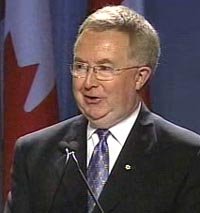I left a comment over here that I like more than most. Publius at Law and Politics was making the claim that constitutional principles are just a thinly disguised form of politics. Here's my take:
"It all depends on the level of abstraction you are dealing with.
Obviously, at some level of abstraction, people pick their process principles based on consequences. If I disagree with what you say, but will defend to the death your right to say it, I probably think that, in the long run, freedom of speech leads to a better society than censorship.
So why don't I just say, "I will defend your right to say it, just so long as your saying it will cause less harm than your not being allowed to say it"?
I don't use that more "pragmatic" rule because it isn't a rule at all, and I figure in the human tendency to want to stop people saying things they don't like.
On the other hand, unless I'm a doctrinaire nutbar, I will eventually come across a situation where I am not going to defend your right to say "it", if "it" is a ransom demand, or shouting fire in a crowded theater or whatever.
How does this apply to constitutional law? Well, we have to factor in the fact that judges, being human, are going to look more unkindly at statutes they disagree with. No principles of constitutional interpretation are gonna change that. At the same time, judges, to retain an ounce of self-respect, have to come up with some principle other than it's unconstitutional if I don't like it. And those of us who aren't judges have to try to hold them to some principle other than it's unconstitutional if they don't like it, particularly if we like different things than they do.
I'm not saying that this principle has to be originalism, or deference to elected branches. It could be representation reinforcement. It could be revealed natural law. But if you don't have some principle other than it gets struck down if I don't like it, you are not playing constitutional law."
Tuesday, October 25, 2005
Saturday, October 22, 2005
Why Joe Clark was wrong

Quebeckers would split almost evenly on the 1995 referendum question, but would overwhelmingly reject secession honestly described: according to an October 2005 Gregg poll .
Reasonable Canadians accept that Francophone Quebecois will always consider Quebec their homeland and the source of their primary loyalty. Reasonable Quebecois recognize that secession has far more costs than benefits. We can both live with that, as long as we can speak frankly.
Subscribe to:
Comments (Atom)
